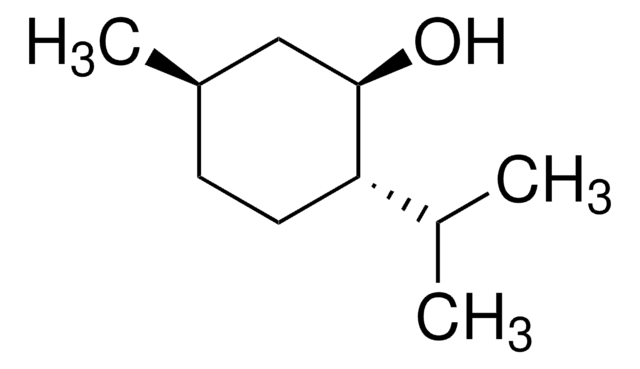W324507
Undecanoic acid
≥99%, FG
Sinónimos:
Hendecanoic acid
About This Item
Productos recomendados
origen biológico
synthetic
grado
FG
Fragrance grade
Agency
follows IFRA guidelines
cumplimiento norm.
EU Regulation 1223/2009
EU Regulation 1334/2008 & 178/2002
FDA
Análisis
≥99%
bp
228 °C/160 mmHg (lit.)
248-250 °C (lit.)
mp
28-31 °C (lit.)
aplicaciones
flavors and fragrances
Documentación
see Safety & Documentation for available documents
alérgeno alimentario
no known allergens
alérgeno de la fragancia
no known allergens
Organoléptico
creamy; waxy
cadena SMILES
CCCCCCCCCCC(O)=O
InChI
1S/C11H22O2/c1-2-3-4-5-6-7-8-9-10-11(12)13/h2-10H2,1H3,(H,12,13)
Clave InChI
ZDPHROOEEOARMN-UHFFFAOYSA-N
¿Está buscando productos similares? Visita Guía de comparación de productos
Categorías relacionadas
Descripción general
Aplicación
- Undecanoic Acid and L-Phenylalanine in Vermiculite: Detection, Characterization, and UV Degradation Studies for Biosignature Identification on Mars.: This research focuses on the detection and characterization of undecanoic acid and L-phenylalanine in vermiculite, with potential applications for biosignature identification on Mars. The study also examines UV degradation, which is crucial for astrobiological research (McIntosh et al., 2024).
- Drugs Form Ternary Complexes with Human Liver Fatty Acid Binding Protein 1 (FABP1) and FABP1 Binding Alters Drug Metabolism.: This paper explores how drugs interact with human liver fatty acid binding protein 1 (FABP1), including the involvement of undecanoic acid, to form ternary complexes that influence drug metabolism. These findings have significant implications for pharmacology and drug development (Yabut et al., 2024).
- Enhancing antifungal and biocompatible efficacy of undecanoic acid through incorporation with chitosan-based nanoemulsion.: This study demonstrates the enhanced antifungal and biocompatible properties of undecanoic acid when incorporated into a chitosan-based nanoemulsion, highlighting potential biomedical applications for this compound (Sathiyaseelan et al., 2024).
- In Vitro Evaluation of Essential Oils and Saturated Fatty Acids for Repellency against the Old-World Sand Fly, Phlebotomus papatasi (Scopoli) (Diptera: Psychodidae).: This research evaluates the repellency of essential oils and saturated fatty acids, including undecanoic acid, against the Old-World sand fly. The findings provide insights into developing natural repellents for vector control (Temeyer et al., 2024).
Código de clase de almacenamiento
11 - Combustible Solids
Clase de riesgo para el agua (WGK)
WGK 1
Punto de inflamabilidad (°F)
>233.6 °F
Punto de inflamabilidad (°C)
> 112 °C
Equipo de protección personal
dust mask type N95 (US), Eyeshields, Gloves
Certificados de análisis (COA)
Busque Certificados de análisis (COA) introduciendo el número de lote del producto. Los números de lote se encuentran en la etiqueta del producto después de las palabras «Lot» o «Batch»
¿Ya tiene este producto?
Encuentre la documentación para los productos que ha comprado recientemente en la Biblioteca de documentos.
Los clientes también vieron
Nuestro equipo de científicos tiene experiencia en todas las áreas de investigación: Ciencias de la vida, Ciencia de los materiales, Síntesis química, Cromatografía, Analítica y muchas otras.
Póngase en contacto con el Servicio técnico








